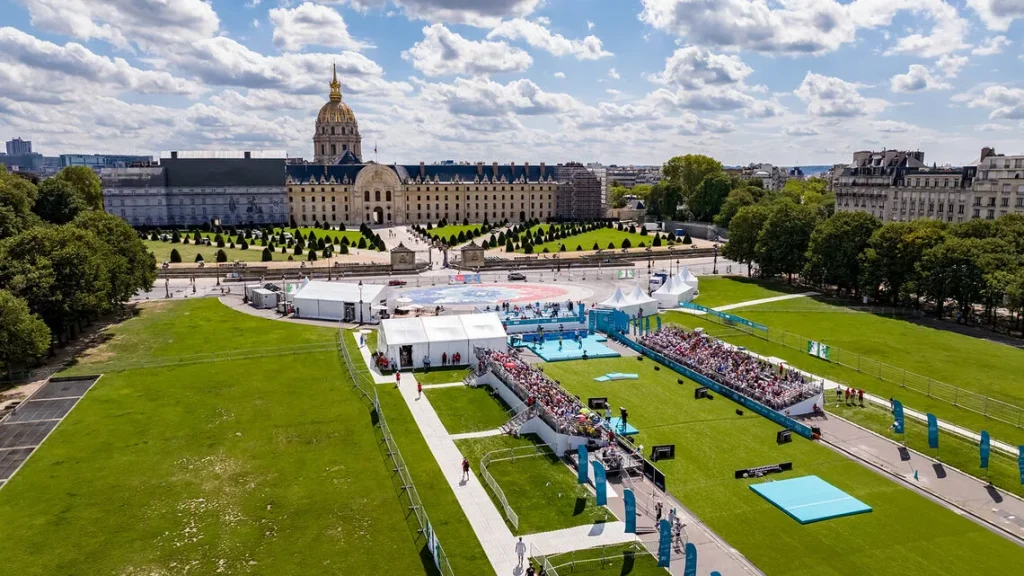Qualifying for archery at the Paris 2024 (next Olympic games) is a rigorous process that requires athletes to meet specific criteria and participate in a series of competitions. The qualification process aims to ensure that only the most skilled archers from around the world are able to compete at this prestigious standalone event. In this overview, we will discuss the key steps involved in qualifying for archery at Paris 2024.

Step 1: National Eligibility
Before an athlete can qualify for archery at the Paris 2024 Olympics, they must first be eligible to represent their respective countries. Each country has its own selection criteria and processes in place to determine which archers are eligible to compete internationally. Archers must meet nationality requirements as determined by their respective national federations and comply with all rules and regulations set by World Archery, the international governing body for the sport.
Step 2: Minimum Athletic Standards
To ensure competitive balance and maintain a high level of professionalism, participants in Olympic-level archery competition must meet certain minimum athletic standards. These standards address factors such as shooting scores, physical fitness, technical skills, and age requirements. The details of these standards may vary slightly depending on gender and discipline (recurve or compound). It is essential for aspiring Olympic archers to consistently achieve scores that meet or exceed these established standards during qualifying events leading up to Paris 2024.
Step 3: International Competitions
The road to qualifying for Paris Olympics 2024 begins with participation in various international competitions recognized by World Archery. These competitions include…
1/ Continental Championships
- Held every two years, the continental games is considered the pinnacle event in archery,
- Features competitions in recurve and compound bow, for both individual and various team categories such as the men’s and women’s team as well as a mixed team event,
- Each continent (Africa, Americas, Asia, Europe, Oceania) holds its own championship event every two years, and
- The next edition will be held in Utah, host country USA in 2025 next year.
2/ World Cup Stage
- An annual circuit for national teams, running from April to September,
- Features four stages held in different locations around the world as the host nation,
- Each stage consists of individual and team competitions in recurve and compound bows.
3/ World Archery Championships
- The next world games are will be held in Chengdu, China in 2027.
4/ Paralympic Games
- Features individual and team competitions in recurve bows only, for athletes with various disabilities.
5/ Other designated events where athletes can earn ranking points based on their performance.
- Indoor Archery World Series
This is just a selection of some of the major international archery competitions. There are many other regional and national events held throughout the year. The Final Olympic Qualification Tournament (FTQT) for archery at the Paris 2024 Olympics will be held in Antalya, Turkey, from June 14 to 17, 2024, the end of the qualification period. Accumulating ranking points in the final qualification tournament is crucial as it determines an athlete quotas and position on the official Olympic qualification world ranking list.
What’s on offer at the FTQT:
- This Olympic qualifying tournament offers three team places (nine individual spots) per gender for the Olympics.
- It’s open to all National Olympic Committees (NOCs) that haven’t yet secured a team quota through previous events like the 2023 World Archery Championships and the Continental Qualification Tournaments.
- The top three ranked teams per gender at the FTQT will each earn three Olympic team quota spots for their nations.
- Additionally, the two highest-ranked eligible archers from their respective NOCs in the individual competition also secure quota places for their countries.
Step 4: Continental Quotas
National federations have an opportunity to earn continental quota slots for their respective countries. These continental qualifiers are allocated to the best-ranked nations from each continental region based on the official Olympic qualification rankings list as determined by the International Olympic Committee. The number of quotas available can vary depending on the region and may differ between genders and disciplines.
Step 5: Individual Quota Places
In addition to continental quotas, individual archers can secure qualification slots for Paris 2024 through various means. The highest-ranked athletes who have not already secured a spot through the continental quotas will be individually allocated these additional places via invitation or allocation according to their ranking position.
Step 6: Team Events
Alongside men’s individual and women’s events, archery also features team competitions at the Olympic Games. To qualify for the team events, national federations must meet specific criteria set by World Archery. A country’s team consists of individual qualification, thus, archers may participate in team events as well as additional selection criteria specified by each National Olympic Committees.
Step 7: Finalization and Confirmation
Once all qualification spots have been allocated, both individually and by teams, through the Olympic Qualification System, each country’s national federation submits its final entries and the number of spots its going to compete in archery at Paris 2024. It is important to note that securing a qualification slot does not guarantee an athlete’s participation since individual federations reserve the right to decide which athletes will represent them at the Olympic Games based on their own selection processes and qualification procedure.
In conclusion, qualifying for archery at Olympic Games Paris 2024 requires aspiring athletes to meet specific eligibility criteria, achieve minimum athletic standards, participate in international competitions, and earn individual places or team qualification slots. The process is challenging but rewards those dedicated individuals who demonstrate exceptional talent and skill in this traditional yet highly competitive sport, so a Olympic gold medal is hard to come by.
